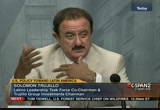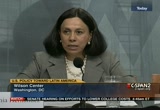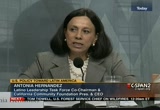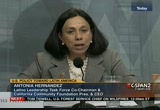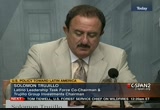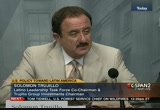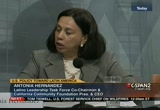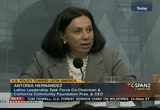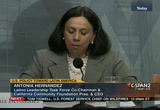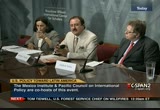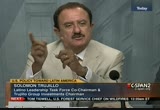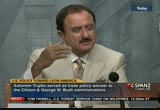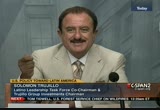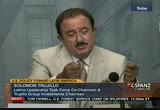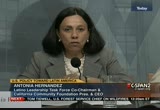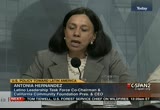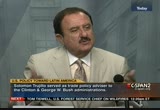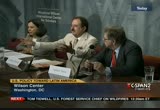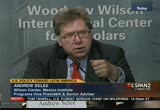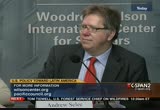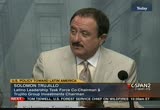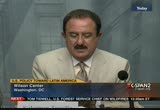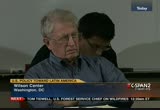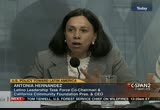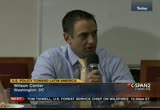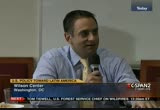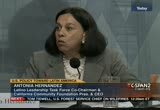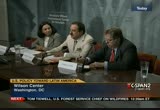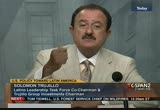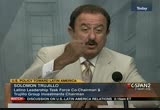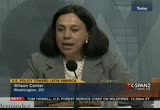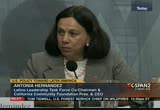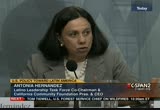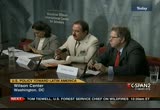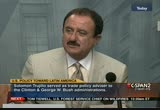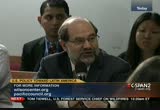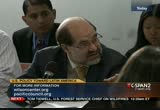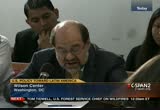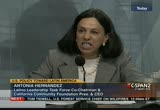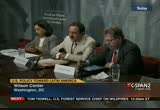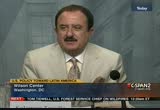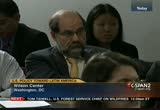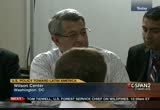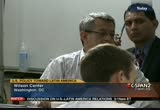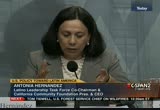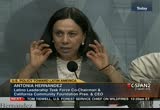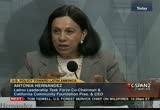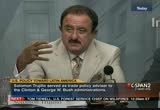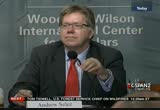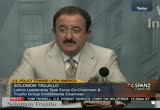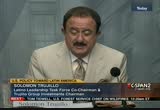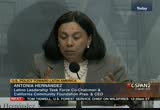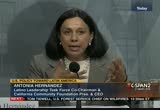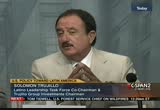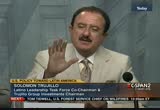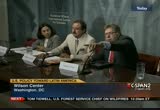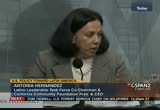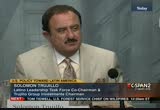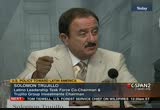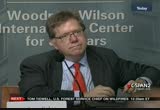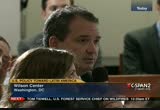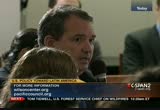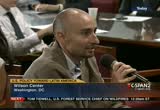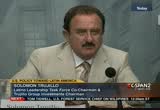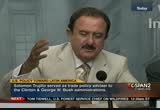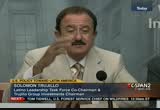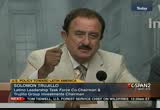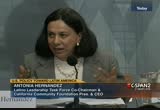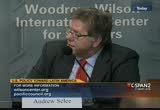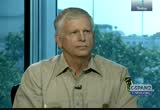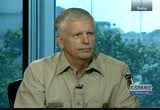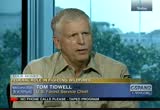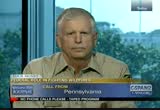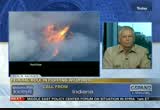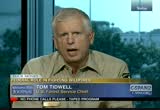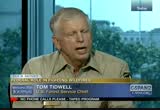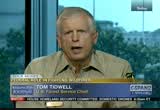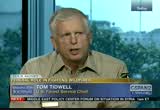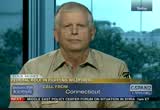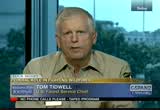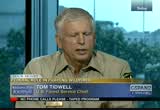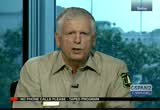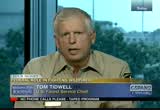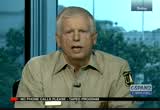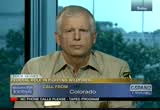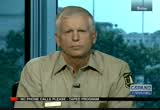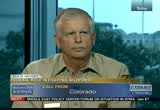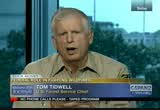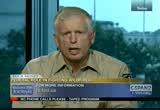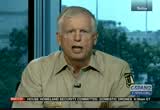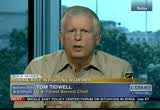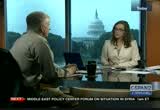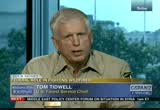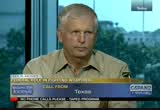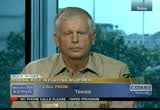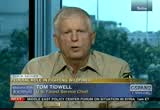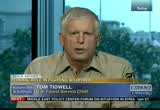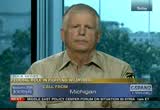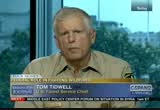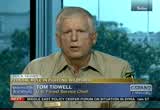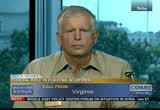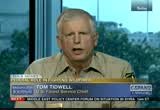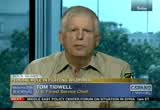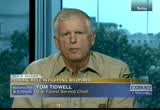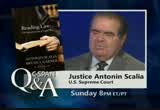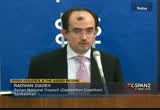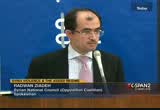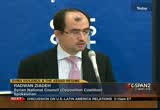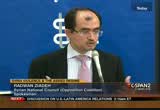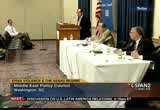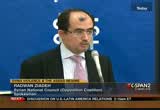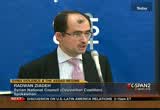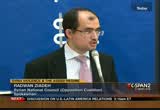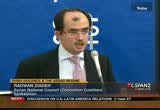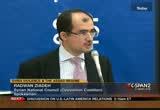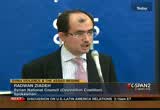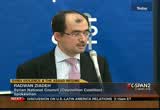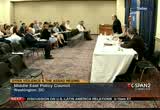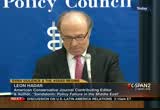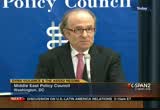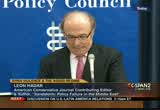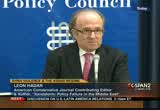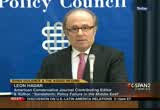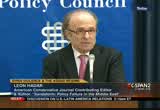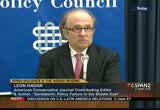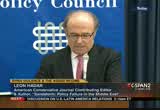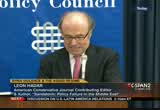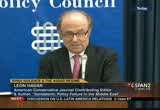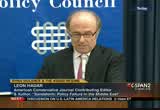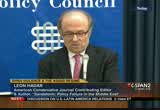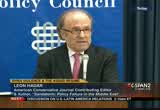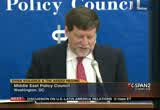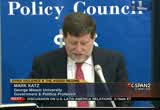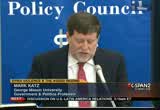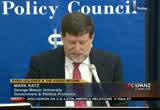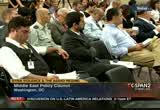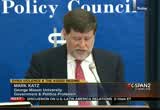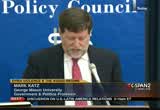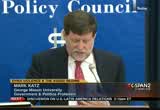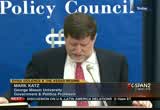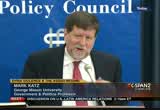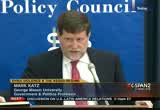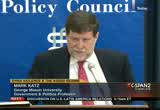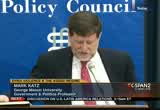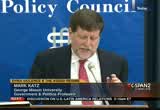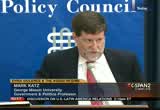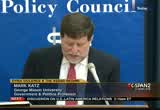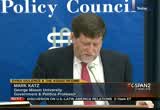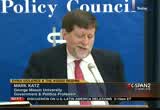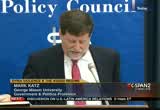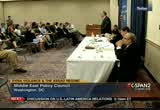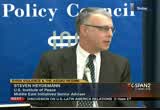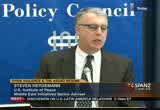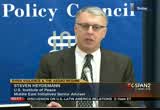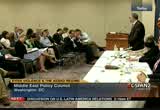tv Capital News Today CSPAN July 23, 2012 11:00pm-1:59am EDT
11:00 pm
do business here but also do a lot of business across borders. so when we think about the story, when we think about the impact, when we think about the importance and about the politics, when we think about the economics, all this to me is exciting. it's compelling, and therefore it is an important. >> you put together a task force to affect people from business it has people in politics. people come out of civil society and religious backgrounds, some people are themselves immigrants but from others it is bubbly 5647 the generation on their background. is there a particular approach to the region? to latinos and something interesting to say about the relationship in the hemisphere? >> i believe that latinos do have a special interest and relationship to south of the
11:01 pm
border. many of us have familial relationships. some recent, some past culture language. and i don't believe that this country has ever really focused on these attributes that could be a benefit to the united states coming and why today i think the timing couldn't be better. the growth of the latino community in the united states is the largest minority group in the united states. its voting power has been increasing tremendously and i do think that looking at south of the border there are opportunities, positive opportunities that benefit this country by a closer alliance and closer relationship. as an example, i don't think
11:02 pm
americans truly understand the significant changes that have occurred both domestically and internationally south of the border that would benefit paying more attention. as an example, the evolution and the strengthening of democracy in certain important large countries in south america and central america mexico, colombia, brazil. you know, we have cemented the space ideals of a space form of government, and coupled with that has been the growth of its economy and in fact in certain countries, you know, mexico and brazil as an example a naturally their growth has been greater than the united states. welcome here in the united states the growth of the latino community has also been quite impressive and latinos are beginning to take more of the center stage and interest in what happens to this country and
11:03 pm
we believe that the future of the latino community in this country is tied to increasing and improving our relationship with south of the border. and so for us this report will highlight the opportunity for a closer relationship that involves and integrates the latino community in to foreign policy. >> how much does it matter economically in the united states? >> welcome to me it is dramatic. it's substantial. it's significant, and in many different ways in the examples i cited before about the trade and exports to mexico to latin america they are critical and if you look at the growth of the economy, the gdp growth today this year, last year and what is projected for next year, the americas if you think about
11:04 pm
latin america in particular you will see the growth rates or matching those that we think about to the east and are clearly higher than what they hear are in the u.s. and europe. so in a relative sense, you know, it's very significant. so as i also event think about it as a business person, i think about how underdeveloped their relationships or as well. we can talk about a good historical relationship but as a business person you always say is there more than you could have? are there good relationships that could be built? the answer is absolutely yes by facilitating trade agreements, by facilitating joint partnerships and relationships with research institutions, ip development and many different forms creating the greater stimulus because we have a
11:05 pm
longstanding relationship of trade and significant trade and in the americas and my sense is that it can be developed much further. >> how about on the issue of migration and the public eye primarily as the u.s. in addition to was in bed and looked at from the other side for mexico, central america, the dominican republic and elsewhere people would look at it as without migration. what should the dialogue be in the united states and these countries and in the united states? >> on the migration issues - we need a whole different new perspective. if you look domestically at the country, you are looking at it an aging population and even though we are in the midst of high unemployment, and people think today if you look ten years from now, this country is going to have deficit both at
11:06 pm
the low end and at the high end. so i think we need to get migration very differently. secondly, from the sort of more we work with and collaborate with our partners to the south to develop economic opportunities at home, the less migration we are going to have in this country. and i think to the degree that we can reform our immigration law and have an honest conversation about migration and separate because there are two issues. first is the contentious issue that we are dealing with and we hear about all the time is the number of immigrants in this country and what we are going to do with those individuals and that is what gets the headlines. what doesn't get the headline is in the midst of the unemployment
11:07 pm
, most of these people are employed and so from an economic perspective, there is the need for the workers whether we acknowledge it or not. the other issue that we need to talk about is if and when we deal with the issue of immigrants in the country what should our immigration policy be? you know, how do we encourage our system and process? where should of immigrants come from? we are a country of immigrants and what has made us unique is the fact that we have a fluid society in which to a large degree we benefit from the best and the brightest through what the world. in my view that is changing a lot of countries as they improve their economies. a lot of the people want to stay at home. but to a large degree we have benefited from it and i think we need to have a real rational
11:08 pm
discussion of migration without the emotional and the 800-pound gorilla on the immigration debate is where the people come from. the fact that the perception is the majority of immigrants and latinos and the perception is that this country is going through a cultural change in the stock about more and more but i think that hopefully to us this is not a report on just migration to bate it is a holistic report that looks at the broad perspective of how latinos look at the issue of space forms of government. we look at security, we look most importantly on economics and health migration fits into all of this. you can't separate one from the other. they are interwoven. >> i just want to have perhaps a
11:09 pm
dimension about immigration and how to think about it in economics context. those of our economists would say you create gdp growth in two ways. one is population growth and the second is productivity. there was an economist from i think it was a black rock his name was robert. he wrote an op-ed piece in "the wall street journal" about a year ago, and in their he talked about what i would call global market share of goods and services produced and who is taking cheri and losing share? and if you went back to the year 2000 and you looked at the relative rankings, the united states of america according to his data had about 25% share let's call it the global gdp.
11:10 pm
the question was then in 2010 what happened to the united states of america's global market share? and attending to that is the idea but most of it is seeing the emergence of the brick countries. china, india, russia, brazil. and you look back and say so, what do you think happened to the u.s. market? and i could give a quiz in this room and say okay give me some numbers if we were up 25 in the year 2000 where do you think we were at 2010? because we can't do that and we don't have enough time i will give you the answers. the answer that i thought of was if we were in 25 and 2010, my guess, my personal guess would have been there were probably about 20, 21% in 2010 versus the year 2000 thinking about china
11:11 pm
taking the market share and india etc. and the answer was no pity that the end of 2010 we were still up 25%. so you would say why. and the answer is that there are two parts of the world that lost significant shares. one was europe, western europe in particular where they were down over the decade about 8% and the other was japan, which most of us remember in the prior 20 years was the economic powerhouse, and they lost about 17% share of global gdp and the u.s. share so again, the question is why. and the answer that robert gates as an economist and i think most
11:12 pm
economists would give is immigration. we have a policy coming and we have flows of people that are coming into the u.s. bringing skills at various levels coming and filling the key categories of capability to help us drive productivity and while they are here because they are creating productive productivity, and they personally are creating in comes and their ability to pay taxes to buy goods and services at sadr, etc., that is what creates economic growth. and succumb to support antonia's pointed to support the plan that says we need to fix the immigration system, the broken process that exists that no new immigrants and bring in some ways what rupert murdoch and mayor bloomberg testified before congress to say there's about a
11:13 pm
trillion dollar boom sitting there for the economy if we can resolve a lot of these issues and deal with them in a very fact and a database by. let me ask one final question before we open up for discussion. it's interesting the the task force was convened by the specific to the kovacic council that was done on the west coast primarily, but that this was driven by people on the west coast. does that tell us anything? >> yes it does. and as you know, unfortunately, our foreign policy as well as our domestic policy is very east coast centric, and particularly when it comes to policy. it's what i call the boston and new york d.c. corridor. the fact of the matter is a lot of the changes come a lot of the
11:14 pm
creativity are happening in the west coast. the desolate of valley and where most of the technology is. look at the impact of the population and the diversity of the population. it's in the west coast, and seldom does this country really look at the sort of changes in evolution and its population and where things are happening. it is one of the focuses of the council now. latinos are no longer a west coast phenomena. as most of you know, latinas have spread throughout the country and in fact the largest and most profound growth of the community has been in the southeast part of the united states in georgia, florida, the carolinas arkansas. all of those areas have seen some nominal growth. but as far as the sort of anchor growth of the latino community is texas and california and so
11:15 pm
what we want to do is just sort of enhanced the perspective of the country, and quite frankly for me it is an opportunity. we are in an election cycle and unfortunately, you know, the americas has received very little attention. the story here is that nobody really understands the growth and the evolution of our neighbors to the south. and our future as to the way the world is evolving is in clusters and we just have to take for granted our largest economic partners canada and mexico. we have to take for granted not very much cover the stories of the certification of space forms of government. we worry about all these other unstable governments. you know, but we don't invest as much in south of the border so
11:16 pm
for us it is a we've just getting the different perspectives of the opportunities. not the issues, the problems. we are not shying away from them the opportunities going forward, and hopefully getting our candidates and the public to engage in a discussion and to better understand the opportunities and possibilities with our neighbors to the south. sprigg is there a different sensibility in the west towards asia and latin america that he might find on the east coast? >> absolutely. you know, has just described, there is what i would call the atlantic seaboard mind-set which is, you know, hysterically as a nation we have been very focused to year at, and rightfully so because that was the genesis of how our economy, how our primary trade relationships etc. flow. but as we find in markets and as
11:17 pm
we find in life, life evolves, markets evolves and growth has evolved differently. so if you are out last and in particular on the pacific were coming you first noticed this the transition action happening to the east in china and india, kind of coal a scheppach kind corridor. and also there has been that continued knowledge about life in america. there's been an interesting dynamic beyond asia which we won't talk about today. but this dynamic about the robust economy, the evolving democracy is a dynamic change that has been happening over the last decade or so and clearly if you are from the west come from the southwest, you appreciate it and you see it and you can
11:18 pm
relate to it. you have relationships come either business relationships or personal family relationships living in those economies, and that's really important for us to understand as a nation is to be real time to be able to a golf and build those relationships and leverage them much more rapidly than perhaps if you are not quite appreciating them and so that is the strength of fighting with the pacific council and the task force is trying to deal with. >> i should know some of his work in mexico and the united states economic ties are not solely limited to the west. as a matter of fact some of the deepest economic ties are in texas and indiana and nebraska and michigan and new hampshire. although the united states is deeply tied to mexico and if you to look specifically at central
11:19 pm
america and south america and the caribbean you'd find the same pattern. it is not only the west that has lead to latin america very deep way is it depends on trade and exports to the country south of the hemisphere, but has said in different ways there is a different sensibility and perhaps a different ability to take advantage of the relationship because latin america is present in the west. it's a lot easier to take advantage of these relationships and these economic ties than perhaps it is another parts of the country. let's open it up to discussion here. we have very knowledgeable people in the room if you want to join the discussion raise your hand and if you don't mind identifying yourself, your name and institution and wait for a microphone because since we are filming this both for the woodrow wilson center web site and for c-span, please wait for a microphone so you can be heard by or larger audience. who wants to jump start the conversation?
11:20 pm
>> we have to gentleman over here. >> ted wilkinson at the foreign service institute. i would like to pursue the question a little bit further. i think when he asked what's different on the west coast got the impression that your answer was that the west coast opinion focus is more on latin america and appreciates more the ties with latin america than perhaps washington does. every administration has been elected to the last 20 years has come and so we must focus more on latin america and as soon as they get into office something happens. how would you expressed your recommendation to whoever takes office in january next year
11:21 pm
whether it be the republicans come to keep the focus on latin america how do you do that? >> i think first, you know, right now as a nation, we are struggling with a fairly weak economy some might say it's stronger than that and some might say it's bigger than that but i think most of us would agree we have a fairly weak economy right now. and unemployment is relatively high some of the highest levels we have had for a long time. so when we think about how we strengthen our economy and how do we continue to support it, it seems to me that one of the biggest arguments here for keeping this part of the world as a part of our focus and solving some of the issues is to make it part of the economic story and to have very specific
11:22 pm
tangible action plans around how you continue to increase trade agreements with some of the country's country flows facilitating some of the issues and i don't want to bore anybody here with some of the details. but i talked to businesses and arizona and california and others that the amount of business they are doing just sending trucks into mexico with goods and services from companies in the u.s. is huge and finding kind of the symmetrical relationships that we can facilitate companies from mexico and other places coming in and our companies from the u.s. going into those as important. when we think about the amount of exports facilitating that, thinking like we do in the u.s. about reducing regulation etc. so the companies can do business more cost effectively and
11:23 pm
increasing the volumes to the south. so i guess my punch line is making it part of the economic story. make it part of actual transition plans and implementation because there are many things that can be done to increase the volume and actually stimulate more job creation in the u.s. to this but i would like to add its different looking at foreign policy as you know in the foreign policy, foreign policy is based on the crisis and issues and concerns and for reasons the americans have been taken for granted. but if you look at terrorism which is a crisis issue is cementing and space forms of government south of the border is critical in minimizing the
11:24 pm
impact. if you look at, you know, the issues that sort of separate us in the foreign policy, you can apply those issues to solve the border the crisis issues as a preventive way and as an opportunity. one of the problems that the american faces and it's not for me latino perspective but from a total perspective is lack of attention just taken for granted that nothing much is happening in the americas. the fact of the matter is that from a crisis perspective going forward, there are three basic crisis. the issue of terrorism and that is why supporting and working with countries south of the border to strengthen the space governments, the rule of law is important from an economic perspective the world is forming into economic clusters.
11:25 pm
those are the trade partners and if we want to continue to be an economic voice in the world, that is where our future lies and so that is an important issue. and i think sort of trying to expand our definition of the foreign relations being reactive to the surgeon crisis in parts of the world that are important but not critical to the future. >> i am from the inter-american development bank. thank you for being here. it's a great forum. one of the thoughts i have is that antonio just mentioned there is not much attention given to the americas. unfortunately the attention given to the americas in particular mexico and the u.s. media it's always - 490%
11:26 pm
negative. it's always about drugs. it's always about illegal immigrants and it's always about stealing our jobs and all that. and, you know, to me to sort of turnaround this we have to begin to turn out of the media as well. clearly those problematic things are true but unlike how many people know that mexico is the fifth largest export of automobiles in the world? the economic and as you are saying also on the political side, the progress that some of these companies and countries have made and the fact that in some ways they are becoming more like us. mexico and brazil have venture capital industry is beginning to develop. the angel investors. a lot of things are happening. but somehow this coverage never takes place. even if you look at the media and the spanish media you only hear the sensationalistic things
11:27 pm
they don't necessarily get to know the very progressive things that are happening in the region so my question is line from india and the press we get is like we are walking on clouds. we are so wonderful and yes there is a thousand portable problems also but all the media attention and all parts of this and the media attention on particularly mexico is always . so how we change that? >> well, i think that you have raised a critical, critical issue and concern. and that is, you know, how the american public gets its news and its impressions of people and countries, and one of the things we hope to do in disseminating this report is to focus on the media. you cannot have an american public that feels and understand
11:28 pm
the issue differently than the way it is portrayed and the media will be an important component. in many ways the politicians follow the perceptions and the views of american public. so our goal even though short term but the long-term goal is to turnaround the discussion and the debate and deal with it with facts. actual facts and not mixed perceptions or perceptions. reality is so different from the way that it is viewed and so like other reports, we hope this report will be a little different in the sense that it will incite conversations but will begin that debate. that public debate and i agree with you. going to the editorial board of newspapers, television, talking heads, that is where the conversation should begin. >> my sense of that is in addition to what i'm going to
11:29 pm
say that we need to strike a conversation about something and that is what does over the care of? they care about the economy. they care about jobs. they care about things that are important. so, when we talked about india during the last ten years and we talked about china in the last ten years, we talked about the opportunity for u.s. companies to be able to go there and sell lots of goods and services. take the cover of almost every magazine, every newspaper etc and this morning i was listening to cnbc talking about china and they didn't talk about india this morning they talked about china, and again, we have to bring the facts and the data talking the language that most people can relate to and want to hear. that's one side. the other side is to be quite frank with in the latino community, we have to start talking about the glass as half full house will, which means the
11:30 pm
one of the most frequent conversations we will ever have is about power dropout rate. which is high and is a problem to be solved. but i believe that you have a root cause kind of issue to solve it. how many people in this room know that 50% of all high school graduates this year are going to be latino? okay. well, when you start thinking that way about who is graduating and to is going into the workforce, it starts changing your perception when you start adding to that, then 40% of people entering into the college and university system, a junior colleges and above about 30% of the people going into that system this year are latino. that gives you a much different perspective in saying that everybody is a dropout. and i think so to your point, it's focusing on the issues that
11:31 pm
are important. workforce, economy, other things as we talk about ourselves have to start with us and also then others will start talking about it as well. >> right here and in right over there and we will go to the back i'm sure there is a body attached just can't see it. my apology. >> i was wondering if you could discuss the impact of the 2012 cycle in u.s. foreign policy especially if she could stress the case of the recent victory in mexico and the coming elections. thank you. >> welcome every 12 years the cycle of the potential new president and mexico and the united states takes place and this is the 12th year mexico has elected a new president, and we
11:32 pm
are in the midst of an election and in venezuela the upcoming election. the relationship that the united states has with mexico is complex and nuanced and mostly positive. neglectful but positive. so what once again, the media is always highlighting the negatives. i believe that there is a great opportunity for the united states to evil its relationship with mexico that focuses not just on drug interdiction, that doesn't just focus on migration, but in approving the rule of law to the strengthening space institutions, building upon the
11:33 pm
phenomenal trade relationships. those are the things that i think will define the future of the united states and to some degree the future of mexico. whether it's mexico, the united states and canada, our futures are interwoven and that realization that they are interwoven economically, politically as far as venezuela, you know, in many ways in my view the way to strengthen our relationship with venezuela is to strengthen our relationship with other countries that have more similar forms of government whether it be columbia. and to the degree that we continue to neglect the americas the more opportunity we give to others ways of thinking of how government should be formed. i think what has happened to
11:34 pm
some degree and some latin american countries is due to our neglect. i also think and firmly believe that our foreign policy shouldn't look as latin america wants a partnership and collaboration and not one of dominant domination do it my way or no way. it has to be a partnership. these partnerships are maturing powerful, growing democracies and countries coming and we should partner, and partnership is a two-way thing and that is a challenge because we haven't looked at four in relationships that way with the americas. so it calls for a total realignment at how we look at and deal with our neighbors to the south. ..
11:35 pm
if i was a voting public,s' we started thinking about if oil becomes less important, pricing goes down, what happens to an economy like that over time? what happens to their relationships they're seeking? what happens to a diversified economy, which is what other countries have started dealing with as opposed to being so
11:36 pm
dependent on certain sectors, and we have ways to help stimulate that. we have ways to help create excitement within economies. given some of the relationships and capabilities, technologies, et cetera, we can bring. so i look at it and say, how are we always thinking about making things better, going in with perhaps different arguments, like a business that gets stale. you run out of growth you. can't keep on the same business model. you have to keep on evolving and changing, and i don't think politics are any different. i just think that you need people that are always thinking out of the box, where there are problems. >> thank you very much. let me say how important i think that you are -- i think you are
11:37 pm
bringing new ideas and perspective to foreign policy and i would like to focus on one particular enterprise that is now taking place, which is the transpacific partner, the it's precisely taking care. we need to look more to the south and to -- and i think this is a not very well known organization. not very -- it's public today, and -- the united states joins it, and now there is the process with mexico and canada.
11:38 pm
and here we have the possibility of having an association of three countries, america, mexico, and asia, and we -- from my point of view -- but here weles have these dilemmas that could be a partnership or to be my way only, and i think that the emphasis at the united states is putting because what the u.s. wants to get is the most opportunity. but here i see a possibility, a possibility that now we can discuss this, now we negotiate it, and in two years, more
11:39 pm
common relationship. how the pacific council and your group build the tpp and what you think if you bought that u.s. foreign policy. >> which is really the first manifestation we have seen of the u.s. reaching out to the western hemisphere and the pacific at the same time. >> i think it shows the future direction. the united states was not the original one and realized something was happening, the alliances in the americas, whether it be brazil looking to china, or other partners, and the realization within a government that we need to be part of those discussions, and critical to those discussions. the challenge i see is that, number one, those discussions are happening in this really wonderful -- and it's really
11:40 pm
wonderful but very little public attention is being given to it, and i don't know because i'm not part of government, how significant and the amount of resources they are giving to these initiatives because those economic alliances, whether it's with trade, whether it's intellectual property, a whole variety of issues -- will determine to a large agreeing our ability to enhance our trading and economic ties with these countries, and i must emphasize the issue of a partnership of a give and take, and the united states is not accustomed to going in and having it's ten demands met and if they don't, taking their marbles and going home. it's listening to the need of the other countries and coming to a mutually understanding that embodies the interests of all of the countries to the benefit of all of us. >> just comment on the ip issue
11:41 pm
that you raised. i'm a believer that ip is critical because it's what differentiates companies, it's what differentiates countries, it's what differentiates almost everything in unique ways. meaning that's where you have value. if somebody says i invest my capital to develop something and then everybody can take advantage of it, pretty soon you have generic everything, and you have lack of innovation, and the only thing that right now is really sustaining our economy is the innovative portion of our economy. and so whether it be in terms of creating content, whether it be in terms of creating products and services, the ip element is what i would call core dna for the united states of america.
11:42 pm
and that's the only thing keeping us moving, given some of the other problem wes have right now. if you look at other countries that have emerged, they've emerged maybe in some cases because of a natural resource. they've merged simply because they're structuring their government so they can become productive in perhaps other ways other than just creation of ip. but there's different ways for countries to compete, but i would say that as a principal for the united states, ip is going to be our value-add, not only two decades ago or ten decade ago, but it's going to be important to us ten decades from now in terms of sustaining growth, adding value, and creating more competitive capabilities in the global market because we're not going to bell the low-cost provider,
11:43 pm
other than because we have developed ip, and because we're not about taking our labor rates down to a dollar a day or a dollar an hour or whatever it might be. so, i would say that this is important for trade. i think it's important for other countries. as they evolve and start developing their own forms of ip. >> two questions together. a hand in the back. gabriella, and then -- >> hello. i'm working at the watch right now. and my question is -- you spoke about trade -- free trade agreements. my question is, who benefits from this free trade agreement? because i know that when we do, for instance, free trade agreements put in place because
11:44 pm
the united states and colombia, in a way it benefits the companies there, the companies here, but they're subsidized -- the farmworkers are subsidized here in the united states but what about the farm workers who are not subsidized in countries like in colombia. who really benefits? we do know that in latin america, the poverty level is very high. it's 49%, around that, 48% in colombia. so, that's my question. >> maurice, maybe you know. >> from the center of research and teaching economics at mexico city. i would like to ask you about
11:45 pm
the social -- the society organization. i like very much the prospective about democracy and the strength of the rule of law. from my perspective, the rule of law in democracy is going with the strength of the society. and i think that new foreign policy perfectly needed in civil society organization, how to strength these not going only by the government or by the entrepreneurs. by the kind of relations and not people, amongst people organized >> well, let me start by saying that the our united states is so unique in many ways, and we keep
11:46 pm
talking about economics, but the united states is sort of the foundation of a lot of wonderful attributes that are going worldwide. philanthropy is one. philanthropy is uniquely american. the third sector, the nonprofit sector, the creation of a third sector, is very much an american one, and one of the thing is have been involved in in the issue of migration for quite some time -- is the evolution of a civil society, particularly in mexico. in the last 30 years. and to me, the growth of civil society, the checks and balances, happen when you have a strong democratic form of government. and where the people actually get to choose their elected officials, and are responsive, and they -- the elected
11:47 pm
officials are responsive to the people. and i think particularly in mexico, which i'm most familiar with. there's a lot of room for growth. but to the degree that the united states emphasizes and assists in strengthening the judiciary, strengthening the judicial process, strengthening local police enforcement with checks and balances, that will in a lot of ways improve and enhance economic growth. they go hand in hand. and there's a lot of interaction between, as you know, philanthropy and civil society and the support. i also think that with the growth of economics, economic growth in countries south of the border, that the whole philosophy that we have in this country -- which to some degree we're losing and that is to be a true economic leader -- is to be a philanthropic engaged leader
11:48 pm
and a certain responsibility of the business sector to engage and fund the creation, formation, and growth of civil society, in all countries, whether it be chroma, brazil, chile, you name it. civil society plays an extraordinarily important role in the checks and balances and i'm proud to say that those two attributes our uniquely american. i come from philanthropy. that's why i speak of philanthropy. the growth of philanthropy around the world, whereas before it was uniquely american. when you seal the growth and strength of the third sector, you will see a vibrant society, and in fact, i think -- in russia in the last week, president putin signed into law that not for profit groups that
11:49 pm
receive foreign donations will now have to sign up as a foreign nation. so stifling of the third sectar. i say for latin america, strengthening of the third sector is critical to a vibrant, democratic civil government. >> i guess the only other thing i would add here is this notion you introduced, which is the notion of a nation of laws, the rule of law, in a cycle society -- civil society is very important, and that's part of the founding principles of our nation's constitution. as well as the bill of rights, and i'll say it in two dimensions. the rights of individuals, and the rights of companies. my personal belief is it's very hard to develop robust economies
11:50 pm
that are sustainable unless there is clarity in a civil society about the rights of individuals and the rights of companies. because then you can have ownership, whether it be a thing like intellectual property, or things like as individuals, actual physical property that you own that cannot be taken just by fiat or by some demand, by a governing kind of entity and body. i think the innovation, the entrepreneurship, everything comes with it because i do have rights as a company or as an individual. >> let's take around here -- there are some hands up here, hands in the back, and a hand over here. over to this row.
11:51 pm
>> i know there's a lot of talk about migration, jobs, and in particular what i got from that was that we need a new source of labor and also cheap source of labor. what do you see happening as we start to define our relationships with the countries south of us in terms of their ability to provide us with a cheap source of labor, and do you see any problems with that, for people and policymakers? >> i think first and foremost to be clear, we have not advocated that, meaning our relationship is based on a source of cheap labor. what we have advocate is the fact we do need sources of labor. and labor that comes in many flavors and forms, meaning highly skilled, and different
11:52 pm
skill sets, and in some cases, unskilled but trainable workers. so, i would say, as we think about labor, and human capital movement, as it relates to our relationship, the point of emphasis here has been, we have significant and substantial relationships on trade where there's financial benefit in terms of job creation in the united states in terms of wealth creation in the united states, based upon the trade relationships that have existed and are growing and given the gdp growth in the various economies in the americas, there's more opportunity that's available if we can focus better, if we can enhance some of the relationships and policies, and agreements we have, either in certain places
11:53 pm
or don't exist with some of the countries to the south. >> the hands back there and then over to this side. the gentleman in the back behind the camera. >> hello. i am from the voice of america. my question is also quite in the direction of civil society. i was thinking more in lobbies, pressure groups, these kind of sectors. as the population grows, i think, for example, immigration reform, everybody knows this country needs immigration report, it's stuck in congress, maybe because it's too much in the presidential debate. there is not some group that is able to push and say, we need to get this done. let's get it done? you know what i mean?
11:54 pm
there is no groups to organize and act in this kind of way? >> well, i'll just start by saying that unfortunately in this country, there's very few groups of people that can get our country to come to terms on any issue. we are just in a phase of polarized, and we need to get beyond that to solve issues. i mean, there's different perspectives on the growth of the latino community and the expectations of what the latino community can do in its collective power. what sol and i are trying to do is to present facts. facts about our community, this population, and our opportunity and ability to assist and add value in improving our relationships to the south. what we're trying to do is to get the public and our elected
11:55 pm
officials to look at the issue from a different perspective. immigration reform is central. not just for the latino communities -- and as you all know, not all latinos are -- i mean not all immigrants, undocumented or otherwise, are latinos. and not all immigrants that come to this country are cheap labor. look at silicon valley. that is majority of that part of that population are immigrants that to some degree started silicon valley. if you talk to the business community, whether it's high-skilled jobs, or low-skilled jobs, there is a mismatch in this country between its working population and the need of the business community. we have a lot of things we need to do domestically, from our perspective, it's more investment in educating the
11:56 pm
latino community and those communities that have not gotten into education because we know in this country, education is the seed to upward mobility. we know we need to push education in order to move forward. it's not just the latino issue. it's now an american issue, because the latino population is such a large porch the demographics of this country, and we're trying to elevate the conversation, and hopefully rational minds will reveil. >> i just add to that in the sense that part of what we're trying to do here, the portion about organization. we're trying to bring back data to various organizations and we're leverages one called the pacific council, which has a fairly broad perspective, and is
11:57 pm
multigeographical perspective and there's the pacific council, many other organizations that we're going to bring this information to so that we can eliminate myths in some cases, so, for example, on immigration. a myth that says all these immigrants are social dependents. they're takers, not givers, meaning they're a negative effect on the economy. that is absolutely not correct. i can say that unequivocally. the second thing, you know, in terms of a myth, is they're taking our jobs. well, again, it's a myth, not reality, in the sense of there's many jobs that go unfilled, and those that have questions might want to look at alabama and georgia in the last year after they passed legislation and workers left. nobody wanted those jobs. nobody wanted to work those kinds of pieces of work. so there's plenty of data that
11:58 pm
helps people start crystallizing maybe this reform is critical for the agriculture and the retail sector of the economy, the construction sector, or the entrepreneurial sector of the economy. all of this is data that needs to be brought to the table in an organized fashion. logical fashion. and also then helping understand the human capital flows that are critical for all of our industries as we move forward. and it's taking the conversation to another level, using organizations that already exist, and creating a dialogue that is not emotion-based but always based on what is best for our country, what's best for our economy, and what's best for every individual living here in the u.s. >> let's take a final round here. there were several people
11:59 pm
starting here that had their -- a gentleman over there. >> i'm laura from the department of state. i have a few questions. thank you. one question is about measurement and how you measure the level of government engagement. what diagnostic tools are you using and can you put that data forward, and every group i worked with, -- it would be helpful to have measurements put forward. and then the second is, in terms of the contribution to foreign policy, i imagine it would be -- the secretary does have an initiative looking at what is
12:00 am
best -- but there's an idea of the global latino -- global foreign policy -- and i'm thinking of maria otero in the department of state and she deals with global issues. she brings a special sensibility. >> well, latinos have interests that cross all sectors, and the mistake and sort of the misperception is that we only have sort of kind of a myonic interests. we focus on the americas because there are certain attributes we in general have, which is language, culture, to some
12:01 am
degree religion, affinity, familial ties, and a much nor knew answered relationship and understanding of the issues and the problems, and i understand the -- the question but you talk to anyone involved in foreign affairs, and i don't think you need metrics to come to the conclusion that the americans seldom get the type of interest and understanding as it relates to latin america. andout we have a few latinos in the state department but the number of latinos at the state depther is very low and the failure to include latinos in our government, whether its be the department over education,
12:02 am
state department, it's an ironic statement to say the highest concentration of latinos is in homeland security and immigration control. that tells you a lot. >> i would just add to this notion of metrics. i think that's a great question. and i think that it should require some introspection by the government and individual engaged in the department, as we think about the amount of time spent, resources allocated. it's like in a company. when you have products, you line up resources, depending on the product in this case our trade in the americas is dramatically important. right? i mean, and it's growing. so the question is do we allocate resources thinking about all the layers of policy
12:03 am
in our government and do we allocate resources to it or do we spend most of our resources on less important in an economic sense other parts of the world? and maybe even less important in terms of national security parts 0 of the world. so i'm not trying to be simplistic because i'm a business person about economics. i think the other thing that this leads to is in fact what are the criteria upon which we have spend our time. i would argue, if you and i went and looked at the president's speeches so far this year, or since he became president, and you said, show me the number of words associated -- all the words he hat given in speeches associated with latin america, my bet is it's dramatically under thought about and
12:04 am
reflected upon and talked about. that would be a bet i'd be willing to make without having done the research. at the same time, when we look at congress and we look at the amount of time spent on various issues, the difficulty we have had in getting trade agreements through, in particular relative to latin america. i think there is kind of some anecdotal data that would give us indicators, but i think some of these questions in particular how would we measure allocation resources like in a business? that's a good question. >> take two questions together. there were a handthere and then we'll finish with alejandro here. >> i am with the ipp as intel with the administration
12:05 am
representing the united states, and i want to make observations and for legitimacy purposes of building the question. i want to commend the work of the council and you are doing the task force. it's critical -- latin america is critical to the future of our country for the reasons already said earlier, the commercial tie we have. as a reason why i'm involved with latin america as a professional for many years and i joined the administration. i just want to whine about a lack of engagement and wanted to do something about it. so i commend the work. i actually met in california with pam -- working on this important report, and i'm very excited. and looking forward to seeing the report. whenever it comes out, i'm looking forward to that. on the issue of the number of latinos in the administration
12:06 am
and particularly on the foreign policy apparatus of the united states, i disagree we could do a better job reflecting the diversity in our country in the state department but i do want to point out that all the -- the primary individuals involved at the white house, ied, stayed department until recently, at the defense department, treasury, are all latinos. all of them. this is part of an effort on the part of the administration to -- because i think the administration really does believe -- secretary clinton believes strongly that -- latinos are very effective ambassadors dealing with latin america. since day one on the job i have been trying to connect with latin america and it's challenging. some communities have traditionally had a strong link.
12:07 am
my only cuban american community is one. but it's been a challenge. and i would encourage you in particular to work on a strategy on convincing -- specially on capitol hill about that important link and i think there's something that i think you should focus on. now, just very briefly, i disagree we have not been engaged sufficiently with the region. i can tell you from my van tan point -- perhaps we haven't done a good job of telling the story, but people probably know that we took the lead in doubling lending at the ibb to latin america from 6 billion to $12 billion, precisely we know because as the region grows, demand will grow, and in terms of features, the president went to latin america, el salvador, chile and brazil, and sent a subtle message, and the message
12:08 am
was, here we have three very different kind of government, one to the left, one to the right, and one to the center, but the message was, as long as these countries follow the rule of law and respect democracy, we're willing to work with lots of different kinds of governments. we're not going to decide we are going to favor only one type versus another. it's a subtle message and does take a long time to sink in. and then finally, in terms of the my way or the highway approach, versus what we're trying to do it's a subtle message. i do believe working behind the scenes with governments, trying to give them -- empower them to come the table and feel more comfortable. i can tell you, for example, working very closely with brazil and with mexico to give them a better voice because they -- we
12:09 am
wanted to them to see they're partners at the table. so i guess i actually have no question. >> thank you. >> alejandro, you go and then we'll give antonia a chance to respond. >> i have a question and then just a comment at the end. my question is, if you have found allies or partners, in particular and in general the latino community when trying to have an impact on foreign policy foreign relations. if you do collaborate with actors from latin america, i suppose you work with the embassies here and try to coordinate or whatever, but the two sectors you mentioned, civil society and business. so, i would be particularly
12:10 am
interested in business people from mexico, chile, do they have an agenda? do they try to have an agenda here? or are they completely absent from this process? there are big corporations in latin america and i suppose they would have interests that they tried to promote. that was my question. and then my comment is that i've been here three weeks, and the most recurrent comment or concern is that policymakers and the public in general in the u.s. simply don't see how important mexico and latin america is. it has been an issue for -- i've been attending here -- how come there are no -- what is going on? why don't they see the elephant
12:11 am
in the room more or less? or was it different before? is this something new? more important before 2001, before 9/11, or i can tell by your nods it wasn't. so, -- if it has never been important and should be important now, i don't know. it's just struck me in these past few days that this is the message. don't see how important mexico and latin america in general is. >> i'll start on the -- i want to good back to gustavo and then specifically address the difference part of this. our intent here is not to be critical of the current government. it's not to be critical of anybody. it's to be constructive in terms of how we think about, focus,
12:12 am
and intent, and it's very nonpartisan because i think in a partisan context, both sides have been very lacking and not strong enough in terms of dealing with this. we have had multiple administrations on both sides. so, very equal opportunity in terms of how we think about the conversation. in terms of your question, you know in the case of mexico, there has been a lot of work over the years where there's even what's called the u.s.-mexico chamber of commerce, it had high profile people involved, at least from mexico people you may have heard of, like ricardo salinas and others from the mexican side of the government. -- not government -- the private enterprise.
12:13 am
and in the u.s. side, there have been some latino business people, hispanic business people and nonhispanic involved, but it's never received what i would call high level visibility. which gets to the rest of your question. if you look at brazil, you look at other major countries to the south, not sure there's been a great initiative on their part, to centrally connect in with community here. it's been more of, i'm a big country, i can come in and lobby directly, and build my relationships perhaps in a different way. but i think that the bigger issue that has been cross-cutting for decades has been the fact that even though it is significant, even though there's dramatic growth, it just
12:14 am
doesn't hit the radar screen as measured by looking for metrics. the amount of speeches, the amount of business, the amount of time, and even in the media where you look and occasionally you'll see brazil on a cover of a magazine, but it's 70-80% of the time you're talking about countries, you're talking about india and china. people have forgotten and not even noticed the fact that mexico's gdp growth has been impressive, and people haven't noticed to a great extent what has happened with the miracles in colombia, and chile, and some of the other countries that have just developed very strong economies that have solidified their government and the democracy. so, part of what we're also going to be doing is trying to
12:15 am
work with the media in the sense of bringing forth the data, correlating illit against -- correlating it against other stories so that this is really a true democracy and economic miracle that's been happening to the south, and it correlates with everything that is important to us in the u.s., and perhaps there should be more knowledge, more recognition, and finding ways to catalyze what is happening more so than what we're doing today. >> antonia, final remarks. >> i would say that the end game or goal with this report and bringing together this task force, is to inform the public about the importance of the relationship of latinos, the united states, and our neighbors to the south.
12:16 am
and hopefully engage in a conversation that is more rational, and it's sort of like -- it's sort of like a familial neglect. you focus on where the trouble and is you take for granted the closest people to you. and i think that that's what has happened, and the point that we're trying to make is that's no longer acceptable. the future of this country is tied to the future of the americas. economically, politically, and otherwise. and within that future, the role of the latino community, both domestically and in foreign affairs, is just as important, and that we should be seen not just a community issues and problems, and that the press cannot just report the negative,
12:17 am
and create bad perceptions of takers, rather than participants, and contributors to the future growth of this country and that's what we're trying to do here. it's the beginning of a conversation. we're going to issue the report. hopefully within the next month and a half, two months. we want to take advantage of the political climate to find avenues for engaging in this conversation, and we hope that you will be our partners in trying to get a different conversation when it comes to the latino community in the united states and its role in foreign affairs. >> i want to thank everyone who has taken part in this, our partners in the pacific council. miguel, who organized this. thank you, miguel, and antonia and sol for bringing with us
12:18 am
these very interesting finding from the task force. the report will be out in the fall. we look forward to sharing that with you. we think there are very important elements here and hopefully this will be one more element as we move into electoral season on both sides of the aisle. >> thank you. [applause] '
12:19 am
12:20 am
business, not because they had a love of books bought they were business people. i think you have to have kind of a gut attachment to books, to care enough about them, because your customers like that. they come because they really care about books. >> next, a discussion on the federal response to large wildfires in the united states. tom tidwell, chief over the u.s. forest service, was a guest on washington journal, this is 40 minutes. >> host: every monday morning we have our "your money" segment where we look at a program of the federal budget, what it costs, what kind of money is spent on it and what it costs and who it effects. this morning we are looking at fighting wildfires. here to join us is tom tidwell, the u.s. forest service chief.
12:21 am
thanks for being here. >> guest: thank you. >> host: take us through first of all an overview of what the u.s. forest service does when it comes to fighting forest fires. how much does the federal government get involved? >> guest: the u.s. forest service is one of five different agencies that actively involved in dealing with wildland fire spruce throughout the years. the agencies with the department of interior, commerce, fema, and also at times the department of defense, also play a very significant role. this is in conjunction with our partners from the states, the counties, and local fire. so what it takes all of us working together to be able to be as effective as we are to deal with the number of wildland fires this year. >> host: how has the fire season been this summer? where are the hot spots? >> guest: we're continuing to have above average fire season through the central part of the west, colorado, utah, southern idaho, and we expect that's going to continue throughout the
12:22 am
rest of the summer, and then as the fire season progresses we can expect an increase california and probably up into oregon this year. >> host: what -- saw fires in colorado, of course. who makes the decision about when the federal government gets involved? what has to be at stake and where does the fire have to be burping. >> guest: when a fire first gets started it's the initial attack resource, whether the local city, county, or local forest service. they respond immediately to the fire. they quickly do a sizeup to indicate if they have enough resources to handle it, and if not, they then start to order in what we call national resources and they call the dispatch center and order whatever crews they need, what additional engines, what aircraft is needed, and then through the national system, those resources are dispatched to that fire. >> host: chief tidwell, director of the u.s. forest service. you spent 33 years in the forest service and was named chief in
12:23 am
2009. and has serve in a variety of positions or all levels of the agency. we saw images of firefighting efforts going on, planes dropping suppressant. give us an idea what the men and women do to fight fors. >> guest: it's the firefighters on the ground that put out fires to be able to do that we need the air craft that can drop retardants, helps that dock water, and the engines that deliver water. the folks out there on the ground, they're the ones that actually construct the firelines, the ones that actually make sure the fire gets put out. so it takes a combination of those resources. a lot of it just comes down to hard, very difficult, grueling work, with these folks are constructing lines as the fire burns up to the line and is able to be stopped. >> if you like to talk with chief tidwell about firefighting efforts at the federal level,
12:24 am
here's the numbers to call: >> host: 8400 person enemy work on firefighting, nine air tankers 578 fire engines and 79 helicopters. is that strictly in the u.s. forest service? you mention there are many agencies that work on them. >> guest: those numbers are just for running on any given day. we have a total we can bring just from the forest service, 10,000 firefighters and 8,000 people that help out when we gretna a real active season. this year we have been using up to 25 on large air tankers and we have over 400 helicopters that we can bring to the mission on any given day. those are the total resources be bring and when you add in what
12:25 am
the state and other counties can bring it, it's a tremendous amount of resource and that's what you need. on any given year we'll have 50 to 60,000 wildlands fires across the united states. you don't get to hear about most of those because the majority of those -- in fact with the forest service, 97 to 98% are put out in the initial attack and the news never covers those so the public never hears about those. it's the small personal that because you get the right condition and you see those on the news, the ones you hear about. >> host: let's get to the phones. vick from pennsylvania on our republican line. >> caller: good morning, sir. i've been on the end of that and i see where evergreen corporation has a 747 that can carry 26,000 gallons of retardant. yet i have never seen that
12:26 am
aircraft in service. does she still exist and are you familiar with this? >> guest: yes, we use that aircraft a few years ago in california, and this year what we're using is a dc-10, which we class as one of our large air tankers, and very large air tankers, whether the dc-10 or the 747, very limited areas they can be effective. you have to have general terrain, areas with a larger flight path than our other retardant flames but in the right condition those planes are effective and that's why we use a dc-10 as a very large air tanker. >> host: the firefighting efforts going on and it's not just matter of men and women using water to spray a fire. talk to us about the other have gones done, whether it's creating lines, doing controlled burns, how else do you work on fighting a fire?
12:27 am
>> guest: well, the first thing we -- folks need to understand what it takes, the level of expertise to really size up what needs to be done. that's the sort of thing that gets done quickly because of the people we have that have decades of experience, and then based on that, they then have a strategy about where to construction the lines, where to do burnout operations, to be able to contain the fire. but the first thing on every fire, always going look at what it's going to take to keep the fire out of the community, keep the public safe, and of course to keep our firefighters safe, and then based on that, they will then start constructing line or start to do burnout operations so they can move to control the fire. >> host: our next caller, democratic line in indiana. good morning. go ahead, lee. >> caller: i'm just wondering, with these increasing forest fires not just in california, other places -- is anybody
12:28 am
checked into what it's doing to our atmosphere and our global warming? and are our polar caps expect to increase? >> guest: there's no question when we get these large wildfires there's a lot of carbon emitted into the atmosphere but it's also part of just the natural cycle of events in our national forest. most of our fores we can expect to have periodic fires 'when you get the large catastrophic fires it puts an additional amount of carbon into the atmosphere, but that in itself is not -- we see any increase in the amount of carbon from the wildfires. ideally we would like to have more fires that burn less severe see, fires on the ground, the small diameter material, the grass and the brush and then leaving more of the large trees
12:29 am
standing. those are the ideal conditions we have continued to manage our national forests for. >> host: matt touches on what our last caller did and asked whether large fires have increased over the last decade and there is any connection to climate change? >> guest: large fires have increased over the last decade. without any question. and we contribute that to several things and one of them is an increased warming of the climate. we have seen extend droughts we're having to deal with. our fire seasons in men parties of the country are anywhere from 30 to 60 days longer than what they used to be. we see the snow melt occurs earlier in the year, which allows these fuels to dry out also sooner, and that's where we're seeing these large fires especially early in the fire season like we saw in colorado this year, where we're having record dry fuel moisture and when you combine that with record dry heat and you get the right strong winds blowing, they get an ignition and that's
12:30 am
12:31 am
wildlife habitat just as quickly as we can. >> forest service chief is our guest talking about fighting fire in the u.s. and the federal role. you brought in some to share with us what happens when you make treatment efforts just as a wild land fuel treatment success story from the wild fire in 2011 what we looking at and why is it
12:32 am
significant? >> why it's significant you are looking at to situations where the first picture there wasn't any treatment done and you can see every tree has been killed, every tree has been lost. there's no vegetation on the ground and if you go out there you will see a lot of impact that occurred to the south. when we do our treatment in this picture you are looking here same fired, same situation, location except to read it treatment prior to the fire you still see a lot of green trees that are there and if you walk through you see a lot of pockets that were not burned in a lot of litter on the ground so that is a much better shape and will quickly come back into that site. so we see less watershed impact occurring, before it recovers but what is even more important is that when a fire hits the treated area as it drops out of the treetops, gets down on to the ground and then fire
12:33 am
fighters can be much more effective with their suppression and the difference in what we saw during the wildfires when we did the treatment the firefighters were able to stop the fire before it came into the subdivisions' into the communities and thousands of homes were saved because of the treatment done prior to the fire. >> looking at another example of the treated area and non-treated area but what does that really mean what are you talking about? >> it's fanning out the forest, getting in there and cutting out some of the trees, removing the smaller diameter material but it's to reduce so we have fewer trees per acre so that the five-year gets started and gets up into the top of the trees it can't spread from tree to tree. there's space between the crown. this is what would naturally occur throughout the west and that is the difference that we are seeing today is many of these stamps we have a lot more
12:34 am
trees per acre than what naturally occur so they come in and are thinning out and really reduce the spread on the fire, they reduce the severity and the impact from these wildfires. >> looking at an area in wyoming treated back in 2004 and now let's look at what happened after a fire raged through. you can see some homes that have been saved. >> there's another comparison between what the treatments that were done before the fire and then what happened when the fire hit the treated area. this wasn't a very large area that was done specifically to be able to treat the forest and around the homes so when the fire hit the treated areas the areas within out the fire dropped out of the top and got on the ground as the firefighters were then successful to be able to stop it before it burned into the home. >> let's go to the democratic collar and connecticut. good morning. >> caller: good morning.
12:35 am
you've answered all of my question is pretty much while i was on hold. i did want to bring up that the defense budget is roughly $699 billion a year, the closest one of our enemies cyzicus china at $117 billion you mentioned that you get some of your funds from the defense department. i'm curious whether you are trying to employ veterans in your forest service management areas and what effect has logging had? has it been good, can it be done creatively to help prevent forest fires? i will hang up and listen to your answer. >> that is a storage of good questions. i will try to go through each of them. first of all we send our own appropriations bill so we do get assistance from the department
12:36 am
of defense aircraft when we get into the occupied to help with our delivered fire retardant and the battalion to help us firefighting construct wines and often provide support to provide helicopters and operations etc. but we rely on our budget as is appropriate that every year but at times we do get additional assistance from the department of defense. >> let's look at some of the numbers the forest service budget the total budget for 2012 is $5.1 billion wild life fire management which is $1.7 billion of that the wild fire suppression is $315 million. >> over the last ten years we have seen significant higher proportions of the budget dedicated to dealing with the fires so we are now close to
12:37 am
spending over $2 billion a year, and especially when you factor in the assistance we provide to the states to help them with their efforts that we are over $2 billion a year that primarily takes about half of that for their preparedness resources and that's to pay for the firefighters to have the contracts for aircraft and have the fire engines in place to start at the season and then the other big portion of it of course is to pay for the annual cost of fire suppression itself. every year it is a little different. we submit to congress every year what we call the tenure rolling average to be the best estimate of what we feel we need to pay for the suppression cost each year and that is the converse has been appropriating each year when we request that average. >> asking about logging and the role it played.
12:38 am
>> when i talk about doing the restoration work and especially around our communities it is logging is a mechanical treatment to then be able to use that to offset the cost of doing that work mother the trees or large enough for timber or material that can be used with biomass or by yo energy to everything we are looking at trying to expand the markets so that there's more use for the material that needs to be removed to help us offset the cost of doing this work. so the thinning of the forest is essential and it's one of the things we continue to rely on in the product in history to be able to do this work. it used to be in the forest service that the industry would rely on the forest service to put out x number of sales and that is the number they needed for the industry. but today that relationship has changed.
12:39 am
now we rely on the product industry to be able to do the work, the restoration work that has to be done. it is essential that we find the markets and continue to explore new markets so those industries can stay around to be able to do the restoration work that needs to be done especially around our communities. with all these examples we've been looking at today they make it so that by giving this restoration work we can make a significant difference, reduce the impact in the wild fire itself but also increase our effectiveness so we can keep the fires from burning into our communities. >> host: do you let contract and paper companies going in and do a thinning of forests and a profit for the industry? is that a simple way to explain the relationship? >> yes it is. we contract this workout to the contract and the contractor comes in and does the work and
12:40 am
we move the material, and i believe they are able to make money off the material that they removed so they can stay in business. it's becoming more and more difficult last couple years with our products industries really struggling with the loss of markets so that's why we've been spending a lot of time to expand opportunities for by new energy to be able to use this material. it needs to be removed but to look for different markets. u.s. forest service chief is the rest talking of the federal role in fighting wildfires. markets the next caller in colorado springs, independent line. >> yes, good morning. hello. i live here in colorado springs. i have some knowledge of firefighting and i was also one of the families evacuated from my home for several days because of the canyon fire here in the
12:41 am
springs. you talked earlier about the incrementally attack of the fire and the use of the large air tankers like a dc-10 aircraft that you mentioned and the importance they bring to a five-year fighting capability. it seems to me that those large aircraft bring more retardants sumer to those more gallons per dollar but my question is how do you stop those a caretaker companies especially the large air tanker proven capabilities like the dc-10 to be available to the u.s. forest service if you put them on contract at all you only put them on the call when he needed a contract which relegates them to reduce their readiness level diminishing their effectiveness and quite frankly threatening their continued availability and fidelity as a low-cost commercial option to the
12:42 am
government owned assets. >> we will get a response but first tell about your experience your back in your house now and everything is okay? >> things are okay. we were in the neighborhood literally fire at 25 patio and backyard but we were scared unlike the tragedy that occurred in the mountain shadows area. estimates do you feel like anything could have been done by you or your neighbor to try to prevent this ahead of time in a better way? do you think the fire fighting efforts were effected? >> i think that when you are talking about the firefighters and the emergency responders on the ground they just absolutely can see where they saved our homes. you see where the fire started for example the was a very difficult area to get into, but looking at the top of the coming and i know it out here it seems to me that dropping some lines
12:43 am
along the ridge lines and doing it earlier putting more gallons maybe could have really scared some neighborhoods and that's my question. these companies are in business to support. but if you don't put them on a contract, then they are all going to go out of business and i think you are going to see that so that is my question is how does the service expect them to be available. >> well, mark, first of all i'm sorry that you were out of your home for awhile but it's also great to hear that your home survived and first of all i want to thank you in all of your neighbors for leaving when the sheriff in the city gave the orders for people to evacuate. it's essential for people to do that and i know how hard it is to leave your home especially when you don't see the fire threatening it until in this case a few days later so first of all, thank you for that.
12:44 am
also, when it comes to fire retardant come folks need to understand five-year retardant would slow down for a little while 20 or 30 minutes and that gives time for firefighters to construct a line that when we do a fire like we had up the canyon and when it came over the ridge down in colorado springs, we were using our air tankers on that fire and in addition to the air tankers we are using our large helicopters 15 come 1800 gallons of water in addition to large a year tankers but when you get a five-year of that size it is ineffective and the fire will quickly or spots over it and at times it was in a quarter of a mile in front of the main fire so in those conditions it isn't effective and it doesn't make any difference if we were using
12:45 am
three or four or five of our air tankers dropping 3,000 gallons a load having one plane coming in shopping anywhere from 12 to 20,000 gallons. it needs to be put in a place that will work to begin with. it has to be done accurately and the tankers that were using, they were their right for that fire. if we would have thought the dc-10 would have helped out we would have brought it over to use that, but we have the aircraft there and our folks did an outstanding job on that fire we had the right set of conditions and then blew into colorado springs itself and i wish there was something else we could have done. and i know how difficult it is for people to understand why the flyers can't be started and i can tell you if there was one more aircraft, one more
12:46 am
helicopter also would take, we would have it but it takes a combination of all of the resources when we get the record dry fuel the moisture we had in colorado this year we get the hot temperatures and strong wind blowing the fire is going to move on its own and it doesn't matter how many retirement plans we have, we are not going to be able to stop it until it burns into lighter fuel. and i can tell you from being out there i appreciate what you had to go through but i tell you i also appreciate what our firefighters did. the men and women did a tremendous job and invite the subdivisions to see yes, there was a tragic loss of homes and in this case tragic loss of lives. there were thousands of homes saved and folks don't hear but those as often those are the ones the firefighters were able to pull it away from the homes and put out the backstedt call on fire and they made a
12:47 am
difference. i really appreciate your question and once again, thank you again for doing the right thing and evaluating and you did. spec service chief here's a story from last month in "the new york times" the threat is out as the arsenal shows its age. reporting from colorado the war of the 1954 build on the wrong way and he doubts itself into the air coming from melendez its engines told. you are not leading off the runway as he watched the potbelly plan designed to hunt submarines climb towards its latest mission stopping wild fires in the american west and goes on to say the federal authorities confront the start of what threatens to be one of the fiercest wildfires and memory lean on the fleet of ancient planes converted from other purposes to the danger is often deadly work of scanning this morning treetop with water and flames retardant. talk about the aging fleet, why
12:48 am
is that happening? anything to replace it and what can you do about it? >> aerts tanker fleet, the contract at fleet is the old aircraft and they have done a great job the last decades but they are to the point the need to be replaced. so we put out our air tanker strategy and send it to congress earlier this year that we doubt that we need to move forward and bring out what we are calling the next generation of tankers so we put out a contract this year to start bringing in those new planes and have the contractor is basically in some cases have to retrofited the existing aircraft so we will have three more of these in the next generation on this season and then we will have another four for fire season and the contracts are a range in a way we can continue to add additional aircraft so that if we move forward we have to retire the old aircraft we will be bringing what we call the next generation aircraft.
12:49 am
the next generation are going to be much more modern. they will be faster and carry heavier loads and those are the things that are so important. we found that it's important that these air tankers have a little higher light speed so they can get from one fire to another and they are also to carry at a minimum 3,000 gallons of retardant because that is what we are finding it takes to penetrate through the canopy to get down to where the fire is on the ground and it gets hung up on top and the top of the brush the fire is in the dern underneath it and it's an ineffective drops of those are the things we are continuing to move forward with so we will continue to have enough air tankers to be able to deal with wildfires. >> republican collar in dallas. welcome. good morning. >> my question has to do with fire retardant gel that is
12:50 am
available to spray on homes. i watched tv and i see these homes devastate the and burned to the ground and i wonder what the relationship is in the service and i know most of this has to do with these neighborhoods on the domain of the local fire department. but some of these wild fires from these wildfires are going towards the neighborhood they pretty well know how the fire is and when it's going to get to a certain neighborhood if daschle wasn't available to the local fire department to spray on these homes to save them, what about the responsibility working in conjunction with the five-year department of finding some of this and if it isn't available to spray the homes.
12:51 am
>> the journal that you are referring to can be effective the problem as it has to be applied right before the fire would be coming in the subdivision and then it was only last for a relatively small amount of time, a few hours before it loses its effectiveness and so the problem with that is you have to be -- you have to have the equipment on site to be there as the fire is coming into the subdivision to be able to fit on the structures so that there will be effective. we use the fire in colorado springs. folks were evacuated. they were given a notice to leave like to days before the fire came and it burned in three different directions before finally on the fourth day it took a run towards the community
12:52 am
and you had a short period of time before it actually came into the community. that's the problem with this gel that can be used. it just has to be applied and sit right before the fire is coming into the community and then it only lasts a relatively short period of time so it's not like you can cut your home with it for a few days ahead of the fire. it's one of those things we continue to work with our city fire department to look at everything we can do to make a difference. one of the things we do is ask homeowners and we work with the states and counties and cities to make sure they have the right information they need to make good decisions about how they are building their homes and keeping the brush cleared away from their homes not using compostable material like shake roof, that sort of thing. they can make a difference when they burn into the communities
12:53 am
and today we are seeing larger fires of the have to be more concerned than they used to be so we feel this is the best option as we continue to work with the communities so they can do a better job especially with new construction but even existing construction to clear the brush and keep the material away from your homes and i can tell you it makes a big difference. it doesn't always save every home but it does hold our fire fighters to give them a chance to then be able to quickly extinguish a small fire on a home and be able to save that home buyers is leaving the home. >> service chief tom talking about the role in fighting wildfires. let's go to michigan independent color. hello. estimate by have a question
12:54 am
about a policy shift. i know their used to be more of a let it burn policy towards a lot of these wild fires, and i was just curious as to how that changed over the years and whether or not -- i know you mentioned climate change factors come also urbanization factors. but one of the mitigating factors as to whether or not you will lead a fire burned for the forest health as to when you decide to distinguished. >> thank you. we have never had a let it burn policy. we continue to manage fire where we can safely do that. we are planning on treating over 4 million acres this year on a national forest and we feel we actually need to increase that by another 20% over the next two years. we do the majority of that through the use of fire, the chemical treatment around the
12:55 am
homes but then a lot of the back country we have the conditions to manage the fire to stay in a certain watershed then we will do that. we'll still out there constructing taking suppression efforts but because of the having a very well spread or severity of the fire, we can manage it for what we call resource benefits to continue to thin out the forest and we are going to have to continue to move more of this and we have to be able to do it when we can control it and managing to the point to keep it in the areas that we want to and that is always going to be the challenge. we do quite a bit this early in the fire season but then as this fire season has increased, we stopped all of the prescribed learning in all of our managing in the fire probably about three or four weeks ago because of the severity of the conditions but
12:56 am
it's a tool we have to continue to work on and find ways to manage the fire to be able to deal with the amount of fuel we have in the country. that's going to continue to be the number-one tool is the use of prescribed fire and managed fire. spec one of the earlier calls asked about job opportunities for veterans. people want to find out more they can go to the website usa jobs.gov. that is the resource for the veterans to look for jobs. let's go to virginia. bill, republican line. >> yes i would like to commend the service on the treatment program. i spent 30 years hiking through the mountains of arizona and these people would get out of the house and the office and the experiencing a tree to the area and one of these things packed up so much with brooch averitt couldn't get through the noticed the difference of night and day
12:57 am
and if you don't have that stuff on the ground, the fire can't burn as hot. the trees will burst from the heat of all the stuff piled up on the ground and i think they need to make a project like they used to do were they got all these kids out in the forest lands. i saw some of the unemployment and gives the forest service a shot in the arm and they get some of these people don't want anybody to even get out of the car when they go to the woods. if they would understand these are like a crop the better the trees are treated the better the trees and now you can use the resources and the money you get from are some because they are natural resources to further the benefit of the park system. >> it also takes money. >> it does. and those are the things we put into the budget request each
12:58 am
year and that's why we put out what the exhilarated restoration strategy where it acknowledges that there are 65 to 83 million acres of national forest that need to have some restoration work and that is either timber harvest or prescribed fire on these areas to reduce the threat of catastrophic fire. that's one of the reasons why we put out in that strategy that we need to increase the rate of areas that we are treating each year by 20% over the next two years to recognize the amount of work that's out there. we also want to expand your idea of using youth. we think over the years we've had great success with our youth programs and that's one of the things we want to expand on so they understand what is going on out there but also provide them with the jobs to give them the
12:59 am
chance to be part of doing this restoration work and they can see a difference. it used to be that there was a lot of controversy and debate about why the forest service was out doing restoration work while they were doing timber harvest. spread today that's shifted and there's more and more people that understand we need to do this restoration work so that the date shifted from why to the dialogue today about how the work needs to be done and because of that we are getting more support to do this restoration work and we are seeing community is willing to financially participate because they can see the benefits that occur from the watershed. the watersheds that produce the water they can see by working with the service to the restoration work before we get a fire it's going to help them to be able to keep healthy watershed to continue to produce
1:00 am
1:01 am
1:02 am
another job. >> the syrian foreign minister said the country would be willing to use its chemical weapons in case of a foreigner attack. in washington a panel of middle east experts discuss the latest developments and the role of the community in a conflict that has reportedly killed more than 17,000 syrians. this two hour 15 minute event was hosted by the middle east policy council. >> good morning everyone. thank you for a much for organizing this event fuel focus on three reports.
1:03 am
one is from the outside regime and the opposition of course including the free syrian army, the second point about the regional implication of the conflict and about the u.s. options which everyone connected it has been since it started in march of last year the regime's systematic killings. we are now more of the use of the air force. as i example for the first time using that for rockets they said the first time ever we see in syrian history over 10,000 years we see one of the leaders of the
1:04 am
president of the country. >> no one expected that and that is what happened. the people who have been killed have now received 18,000 including 1,800 children under 18-years-old and of course it means 7%. this is up to normal. to give you a sense of how much has been systematically targeted by the regime. a number of the people that have been detained exceeded 50,000.
1:05 am
we believe the mullen number is much higher. at least more than 27 weapons in the military bases and of course the number of the people. 1 million has been displayed in the country and more than half a million in the lebanon, jordan, turkey and in iraq. the regime of course explored in dusk this we start to no one is called the crisis management group. since the uprising start to the regime established what is the crisis management book and the leadership of the national security office. this is under the leadership of the baathist party but manly
1:06 am
included in the national management group it's that of all of the security branch as along with the minister of defence minister interior and the deputy minister of defense. basically those ten or 12 people take decisions day-by-day who's giving the orders to the military groups were the security to go to the touch on all the demonstrations or a check of the areas and give orders to 18 people and was a big blow exploding within the security of course which left five of those leaders has been killed especially the minister of defense and interior and the
1:07 am
head of the crisis management corporation and the chief of the president of the national security office. after that we expected the regime to grow and then would to some compromise because at least he is basically the number one guy and syria since the uprising started and he was responsible on the killings in the area, the destruction in the area. the other scenario was most likely the regime became more active against his own people and this is what's happened. now the regime gives orders for the air force to attack the areas and different ways.
1:08 am
at the same time this shows the strength of the army. the army control most of the border area and with iraq in the hands of the regime but all the other point with turkey and iraq in the hands of the army. basically the syrian army controlled according to the head of the u.n. mission more than 40% of the territories and syria which of course not become increased because most of that in the hands of the army and of course the northern part of syria and many areas in damascus and down.
1:09 am
what happened exactly the syrian army remains likely on the decision and the arms within that army because when he decided to involve the army in the military operations most of the army salles the officers of sunni and there are some officers that were affected also but what we have that makes the situation we don't have like what happened in yemen there is the fiction and the army what's happened is it is coming from the middle ranking revolt, and this is why the army is getting
1:10 am
much bigger at the same time there is no safety zone or liberated area to organize itself and to its operation and much more organized way. what is done going back and forth in many areas many civilians many people have been killed by the army. manly the syrian army is as i said officers, colonel peery we have now three major generals, three of them in turkey and we have of course two weeks ago i visited and we have more than 1,192 colonels who deflected
1:11 am
based in turkey but most effective of course that the colonels and the middle ranking officers stayed inside the country especially in the area in damascus. what is the state of the opposition? the state of the opposition last week the security council again failed to adopt any resolution to protect the civilians. when it became the situation where even if the resolution had been passed in syria and the discussion we have a nasiriyah is the conflict and still the security council, the officials, the state department the talk about we don't need more
1:12 am
militarization of the situation which already we have armed conflict since six months ago. the situation became much more -- there is not any kind of peaceful demonstration allowed by that regime and they dealt with a peaceful demonstration along with the opposition and the same way in the last months have two incidents where there's been shootings on the peaceful demonstrations which left more than 60 people killed. this is why we don't advise people to go to demonstrate peacefully if this area isn't protected by the army because the implication of the shootings it is very high for the
1:13 am
civilians. this is why when the international community failed to adopt any resolution or take any actions that undermines the position, undermined the syrian national council because the role of the council or the opposition to mobilize the community to protect the civilians would begin the demand on the ground. if that is reflected that is why it became weaker in the eyes of the leaders of the. syrian army defending the people on the ground that became the heroes in the hearts and minds and that is the same situation like we have been kosovo in 1999 in the international community failed to adopt any resolution to protect the civilians and we
1:14 am
show that on the ground right now because most of the areas liberated by the army there is no control and in that sample for any political position there is no political authority to see the national syrian council on that area but this is because the lack of factions by the international community. when the security council field of the first time and we expected that from our visit to moscow and the russian officials and we say that many times more and more of the security council become to the way the actions beyond the security council was much more important. we say many times that to save lives of the children and the
1:15 am
civilians are above the legal security that is given and we come to the situation where many cases have been in the cases where it was unable to adopt. this is why we of the friends of the conference and should they have a very different agenda to take any actions to protect the civilians. of course now we see more and more strength in the army and more areas liberated but i don't think it is expected that the army would be able to liberate damascus for state aside. made the situation getting much bigger more civilians would be killed this is now the priority for the syrian army.
1:16 am
what is more important right now to take the historical decision to take actions beyond the security council to mobilize and the syrian conference and implement the safety zone along with the turkish border into jordan much more expected and enthusiastic also with the jordanian and the syrian border this is a priority right now especially for the civilians for humanitarian assistance for the cities and the people in need even that we have the safety zone in the northern part of syria still attacked by the air force and this is why it's important to have a no-fly zone above the significant areas to protect the civilians.
1:17 am
finally, many questions now about the chemical weapons and the transition. there isn't much more information and the ministry of affairs said they will not use any chemical weapons if only the had been attacked by outsiders. i don't believe that because the regime uses many kinds never used before especially in the areas. this is why we have to be careful with any expectation to chemical weapons. finally i think the united states has failed from the
1:18 am
beginning because the united states should expect it is a time of genocide which can deliver it can do just to stay in power. this is why i think the united states should be prepared to come up to the stage. until then the united states tried immobilizing the international community worth of the security council which of course had been vetoed by russia and china and became a failed policy to try again with of the security council because there is no indication for the change of the russian policy. at the same time the united states there is no indication for the united states that would decide to take any action beyond the security council within the
1:19 am
friends of the syrian people. i think it is important right now for the united states to take actions beyond the council. finally, the transition. i don't see any indication for any here because we shall right now the northern part of syria which manly is concentrated their and the military groups now control the different areas and the syrian army or different groups within the army control many areas also in the northern part of syria and there is no political authority end of this is of course as i said before, this is a consequence for the
1:20 am
inactions from the committee. now they become much more difficult to deal with it because the energy of syria of course will be -- there is no question about that. but again, how to have central government at the end because the regime is losing control and that is lifting the beckham and there is no authority in the decision to control many areas have been liberated and the northern part of syria. this is why i think it's important now for the opposition to work along with the arab league to stay aside and get him say fax it which if he accepted can be accepted a year before.
1:21 am
but again, this shows how the league along with the international community house without any muscle and without any teeth which allows them to continue the killing different areas. more important right now to concentrate on the syrian conference and put all of our efforts to work to make any action because this is the only way to make the transition in syria and a successful way. thank you very much. [applause]
1:22 am
>> first of all i want to thank the council for inviting me. when the asked me i think it was a month ago to attend this meeting and participate in the discussion i suggested at that time that whenever we were thinking about the issue then is going to be overrun by defense by the time we meet today. and i also was reminded when i published the book in the aftermath of the gulf war in 1991 and send it to the printer at the last moment to change the references replace it with the russian federation so i think we're living in a time when so many changes are taking place and functions.
1:23 am
some people compare what is happening with syria to the end of the middle east in general in terms of the political upheaval to what happened in eastern europe in 1991. i am a little bit skeptical but i do enjoy the historical analogies and i am very much into irony so to speak. a few nights ago when a friend of mine who was very much support of the u.s. active role in syria and send me an e-mail about the issue i responded by recalling that not such a long time ago we were being asked to do a regime change in iraq very much like nseries and now the u.s. was asked to correct the bloody military dictatorship
1:24 am
controlled by the secular freshest that party and also a member of the family saddam hussein and also in syria that belongs to a minority sunnis in iraq now muslim speed and syria. the leaders in iraq very much like the position pledged to transform the country and the functioning liberal democracy to adopt a free-market economy and turn iraq into a strategic ally of the united states. instead, we are in a country in iraq which is very much like syria. the european imperialism constituting of many tribal, religious and ethnic groups and
1:25 am
liking the cooking and national identity we have a country sliding into a civil war. washington did help transfer the power in the secular sunni regime to the islamist shiite government. but it actually allied today with the bureaucratic iran. but election did take place in iraq but of the women and religious minorities are frightened of the political power not even going to dwell about the united states in terms of the military economic and credibility in the middle east and elsewhere. so now we are basically being asked if we run in syria.
1:26 am
it took my friend to support the convention and of saying he had the position and syria are challenging, to challenge my argument but i actually noted was thinking about a guy by the name who's agreed decent, educated guy come intellectual from iraq who published a book in the 1980's called the public of fear which detailed what was basically at that time the prism of iraq and was one of the first to call for u.s. intervention in a back to out saddam hussein.
1:27 am
i will just say if you read the book what is great in iraq is about one of the characters. he's not living in baghdad any more. so i think that in the face of the pressure on the obama administration to do something in iraq and asap skepticism at the minimum. under the best case scenario we would replace the alawite regime in damascus which is allied with the islamist sunni governor and saudi arabia. they have these allies of the
1:28 am
united states and iran and hezbollah our adversaries of the united states and this scenario has a certain appeal one could argue that is from the political perspective the power in the persian rise was in favor of iran and its allies thanks to the u.s. intervention in iraq and some who same would now be more in the direction of the united states and its allies which is basically the good news. under the worst-case scenario, the coming to power of the more radical islamist sunni regime in damascus which may or may not be allied with al qaeda with a bloodbath against the alawite religious minorities would spill
1:29 am
over into lebanon and iraq is and what invite outside intervention by regional and global power and it might eventually a middle east war matt we will become a focal point for regional tension between the shiite and sunnis which could spread to the rest of the middle east and syria could become i think what spain was in the late 1930's or lebanon during its long civil war and a platform of testing the confrontation between the major political powers of the day, secular earnest versus islamist and shiite and many patrons, saudi arabia, iran,
1:31 am
1:32 am
of approach. with the obama administration did to ensure the policy of cost cutting and facing the u.s. with the collapse of longtime allies of washington and the growing instability of the middle east, juggling many interest and agenda and between the promotion of change under this condition especially the power to deploy u.s. troops and syria basked to consider allies like saudi arabia u.s.
1:33 am
strategy was very cost effective basically agree letting the turks in the saudis. one continues to reassess the pressure of military intervention. the also why the american thinking that what is going on in the middle east is a manifestation of the unstoppable of read them and democracy. why it should be challenged.
1:34 am
to examine what is really happening as opposed to wishful thinking with global democratic crusaders on the left and on the right. there is some momentum in the middle east with challenges in the region producing a major shift in the balance of power. disintegration of several states. iran, turkey, perhaps egypt says a major powers and the
1:35 am
return of russia with a rival of china. those make it difficult for the united states to affect the changes in the region in explaining the title merieux is not as many options available in syria. thank you. [applause] >> with a pragmatic response to the obama administration has orchestrated sanctions trying to find out who
1:36 am
should get weapons ihop. >> thank you for inviting me to this interesting panel aias went to give my congratulations and also that to she has published 11 of my articles. is a fine journal. i want to talk about russia and syria obviously blocking u.n. security council action on syria. expressing support for the assad regime.
1:37 am
china has done this but the sense china is following were shut up. i was in moscow to talk to various russian experts and western journalists. why are they back gain assad is so strongly and have dug-in? various reasons were cited many talked about the cult arms relationship losing repression investments in the syrian petroleum sector, a naval facilities the only ones outside of the former soviet union. these are important reasons for the fear of losing the
1:38 am
is. but if there was no bass collor russian arms mikasa sales russia would lead to still support the aside regime. talking now why are they supported chain and the assad regime it is the united states? american relented to afghanistan we must set up and we also must up iraq and libya also. some now we want to do something about syria? that will be messed up and
1:39 am
ameritech can go home. back to lou o oceans but russia lives there. it gets messed up for them. that the u.s. is ignorant or the thinking is common are the americans and to link this deliberately to hurt russia? there have been leaders who have made suggestions but all i can say is if this is how they think to suggest how they might dig him.
1:40 am
with libya and particular aggression i have spoken to theo's the u.s. took the advantage last year in libya up. they allowed the no-fly resolution to pass in the security council. what did the u.s. do? instead of managing the no-fly zone asking we assist the opposition with could off the going beyond the terms of the resolution. russia and china helped to approve rimm veba bought fall for that track again. even those that economic
1:41 am
sanctions are less they don't see any resolution except to the alleged for american intervention that they will not approve. they dislike western intervention. but somehow it has the feeling they will not fall for that trick again. other reasons have to do with deep-seated views of foreign policy and international relations. the russians feel america and the west have miscalculated. if they think the downfall
1:42 am
1:43 am
misunderstood. the russians understood this held radical islam is some down. matter how bad the assad regime may be but is better than what could come after words. but of course, in they don't see it as the prospect for russia up. they don't believe democracy takes place in the united states either. americans can help create popular demand but that is followed by something else. we see a reflection of the
1:44 am
deep-seated russian pessimism of this part of the growth. they don't understand why the last this not see this. they also support mencia assad regime that the west has not done that much. the russians have noticed this as well. they have some experience with the united states. they know when we are serious we're able to act outside of the security council. because the u.s. focuses on the security council shows that we use them as the
1:45 am
excuse not to go it in. of her happy not to go in. that makes them look strong and important to block the united states. that is how they want to be seen. this this what the u.s. wants to get involved in? that americans don't understand but they don't want to get involved. contradictions abound. but another reason why they support the assad regime is
1:46 am
they see this syrian opposition being supported by saudi arabia. the russians long had a contentious relationship with saudi arabia. during the cold war during fabs heyday, it was the saudis that in north yemen in the '60s flight team the proxy war with the saudis which by the way ultimately the saudis came up one top. with regard to the soviet invasion and occupation it
1:47 am
was not so much bu's action ba'ath or his soviet ambitions but of saudi arabia, money sent coming individuals, they cause trouble for the soviets like osama bin laden make it a failed venture. others defend the west would be better off with the marxist government instead of the taliban who could come to power once again. the russians have accused him of being the principal backers of the rebels. favored giving assistance to that end chechen refugees.
1:48 am
they cited against the saudis and putin never tired of saying the 9/11 bombers came from saudi arabia but then the russian and united states relations turned sour. i do not want to get into the details of the ever approach meant to that i did not think would have been but it is not -- now falling apart the russians feel the saudis
1:49 am
who were opposed to the arabs bring a they have hijacked it is getting very involved with cnn and now hot they see the saudis trying to knock off the iranian ally with syria. why don't the americans understand this? it is not accurate but this how they view it. but in addition to foreign policy concerns is that syria was a domestic issue in russia there is a general sense the assad regime will fall that putin is better
1:50 am
off backing assad to the bitter end even if he falls then to be seen as conceding to the americans and making russia look and feel week and being implicated from that negative change that occurs in assyria. russia has written off syria altogether. they are much happier that way than cooperating and looking week. if syria is a domestic issue for russia we think we know something about how domestic
1:51 am
politics could affect foreign policy. it should not be a surprise they are affected with this as well. what does this mean? it is obvious. we often heard the administration will help us with serious -- syria. lebanon does not see it in their interest foreign policy zero or domestic that if things go sour they do not want to be associated with it and they want the
1:52 am
u.s. to own the situation. they're not actually going to do anything to zero pose the see there. that if vaxgen comes outside they will not defend the assad regime. there has been a recent story that russian marines have been sent to the naval restitution but ms. similar to this of civil war that these people are deployed to evacuate national's but not
1:53 am
to get involved in protecting the regime. i don't see the russians as stopping us. we see them acting together. that would never cooperation they have is only temporary. if it arises come with the chinese will immediately work to get along. it is only russia that have stuck their neck out to suffer. nitride to convey with the russians form a foreign
1:54 am
policy, that is what one to convey. win read view the rational interest that is not how they see it. a lot of their actions are done to defy the united states for betrayal that in our view we should not but they do. this is the situation to deal with in regard to russia up. thank you. [applause] >> let me offer my thanks to
1:55 am
the metal waste -- moody's policy cows sold to participate in the extraordinarily timely session on syria and the dimensions of responses we have heard discussed this morning. we're meeting following what is an extraordinary week in the unfolding of the 18 months of the syrian uprising. those events with a crisis response team described on wednesday. the high-level defections, a
1:56 am
small number of senior generals no present but the total number is 24 which makes us wonder how many generals are still present. also with confrontation with the armed opposition against the regime. there were clashes between the armed opposition highest ever recorded and we're on pace to increase the scale of confrontation this month. that includes the capture of some of the credit cool border crossing between the syria and turkey and barack
1:57 am
even though control is severely contested. the have collectively produced the most dramatic shift of the syrian a pricing since it began march 2011. despite the counter offensive with chad's created tens of thousands of review jesus it is hard to avoid the conclusion this stalemate between the opposition and regime has been broken to replace the assad regime on the
1:58 am
defensive for the first time it has created a sense of vulnerability that is, saying a shift as a strategic realignment among the critical insiders for those of have continued to support the regime. one of the consequences is there will be an acceleration of the unraveling. way have pariah democratic called tipping point* however in this important to
1:59 am
recognize even as we approach the shift the approach the assad regime still has domestic support. we should not kid ourselves. the regime still has significant international backing as we've heard from russia, i ran, hezbollah and others that all underscores as we see this shift of momentum on the ground it would be a severe mistake to assume the end of
151 Views
IN COLLECTIONS
CSPAN2 Television Archive
Television Archive  Television Archive News Search Service
Television Archive News Search Service 
Uploaded by TV Archive on

 Live Music Archive
Live Music Archive Librivox Free Audio
Librivox Free Audio Metropolitan Museum
Metropolitan Museum Cleveland Museum of Art
Cleveland Museum of Art Internet Arcade
Internet Arcade Console Living Room
Console Living Room Books to Borrow
Books to Borrow Open Library
Open Library TV News
TV News Understanding 9/11
Understanding 9/11